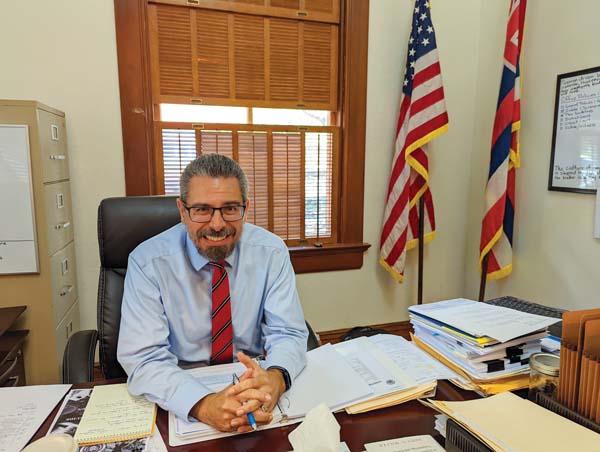New unit to track crime hotspots, streamline prosecution of cases
Data will help attorneys see what’s driving crime instead of just ‘reacting’ to cases

Maui County Prosecuting Attorney Andrew Martin says a new Crime Strategies Unit in the prosecutor’s office will help track crime hotspots and pinpoint offenders who are driving the activity. The unit will help prosecutors communicate better with police to target offenders who are causing crime in a certain area while moving low-level offenders more quickly through alternatives to incarceration. — The Maui News / LILA FUJIMOTO photo
WAILUKU — A new Crime Strategies Unit in the prosecutor’s office will use data to track crime hotspots and trends, then identify the offenders driving the activity, in an attempt to reduce crime in the community.
“We need to modernize our approach to prosecution,” said Maui County Prosecuting Attorney Andrew Martin. “Instead of reacting to arrests, we need to proactively start looking at ways we can reduce crime. One of our goals is to protect the community.”
In the “intelligence-driven prosecution” model, Martin said the prosecutor’s office will analyze crime data from a prosecution standpoint. When crime trends are identified, cases will be reviewed to find connections, including among defendants, and to determine what’s driving a trend and how to address it, he said.
“Is there an individual or a number of individuals who are primarily responsible for this increase in crime in this particular area?” he said. “Let’s focus on the ones who are actually driving the crime trend, then put resources to making the best possible cases against those people.
“By identifying individuals who are driving crime, we can use resources to make sure we get sentences that remove them from society.”
For other defendants, the prosecutor’s office will try a more therapeutic approach, including offering opportunities for rehabilitation, Martin said.
A deputy prosecuting attorney assigned to the Crime Strategies Unit will be on the job in October and will screen cases for low-level offenders who aren’t the ones driving crime so their cases can be handled more quickly through alternatives to incarceration, Martin said.
In the last fiscal year, it took an average of 429 days from arraignment to a change of plea resolving felony cases, Martin said. While the pandemic contributed to some of the delay, the pre-pandemic average was 349 days, he said.
During that time, defendants may be jailed for months or be out in the community, sometimes “continuing to engage in the same behavior,” Martin said.
“We’re not doing them a favor. We’re not doing the community a favor,” he said.
By entering into good faith negotiations and having cases set for trial if they can’t be settled, Martin said the hope is to have cases resolved within six months.
“It’s definitely not having an impact on crime if you’re letting cases linger in the system for more than a year,” he said. “That person’s not getting services, not getting help. If they’re a danger to the community and they’re not in custody, they’re not being removed from the community.”
The prosecutor’s office is recruiting to fill positions for an information systems analyst V and investigator III to join the Crime Strategies Unit in January.
The analyst would work with Police Department analysts to help design ways to improve the flow of data from the department to the prosecutor’s office, Martin said. He said the investigator would do work supporting unit prosecutions.
While one deputy assigned to the unit will coordinate information, it will be shared with all deputy prosecutors so there can be a department-wide strategy, Martin said.
He said the approach includes “opening up the flow of intelligence between police officers and prosecutors” and creating a priority offender list of people who are driving crime in the community.
When the prosecutor’s office began talking with police about who they saw as driving crimes, some of those identified by police “wouldn’t have stood out as someone we really need to focus on,” Martin said.
He said one person involved in driving crime in an area was in the prosecutor’s system as someone involved in “very low-level property type offenses and some misdemeanor-level violent offenses.”
With the new unit, if a high-priority offender is arrested, “we can now say this is someone that needs to be a priority,” Martin said.
In addition to working with the Police Department, the prosecutor’s office will “engage with the community” by having meetings so residents can talk about what’s happening in their neighborhoods, Martin said.
He said one crime trend tracked by both police and the prosecutor’s office is a 41 percent increase in stolen vehicles this year. Through July 28, police said 511 vehicles were reported stolen in Maui County, compared with 363 vehicles stolen during the same period last year.
While the “reactive approach” to the rise in such crimes would be to ask for mandatory prison terms for all defendants charged in stolen vehicle cases, “it would have no effect,” Martin said.
“It would not actually achieve the goal” of reducing crime, he said.
Instead, he said the department is using intelligence-driven prosecution methods to target the increase in vehicle thefts.
While new to Maui County, Crime Strategies Units have existed in prosecutor’s offices around the country for a dozen years, Martin said.
Cyrus Vance, who recently retired as the Manhattan district attorney, was the first to come up with the idea.
“The whole purpose is to build stronger relations with law enforcement, with the community, so you can open up the flow of information into the prosecutor’s office both from law enforcement and the community,” Martin said. “Instead of just reacting to cases that come across your desk, you can make more informed decisions, better direct your resources to individuals who are actually driving crime in the community.”
The Maui County unit won’t be the same as the program in Manhattan or in other areas.
“It will be unique to Maui,” Martin said. “Every community is different.
“When you look at a small community like ours, the impact is magnified. We can make a huge impact with a relatively small amount of resources.”
* Lila Fujimoto can be reached at lfujimoto@mauinews.com.
- Maui County Prosecuting Attorney Andrew Martin says a new Crime Strategies Unit in the prosecutor’s office will help track crime hotspots and pinpoint offenders who are driving the activity. The unit will help prosecutors communicate better with police to target offenders who are causing crime in a certain area while moving low-level offenders more quickly through alternatives to incarceration. — The Maui News / LILA FUJIMOTO photo







